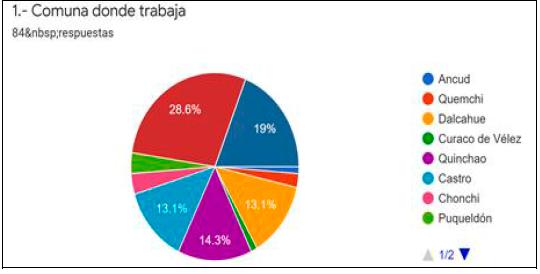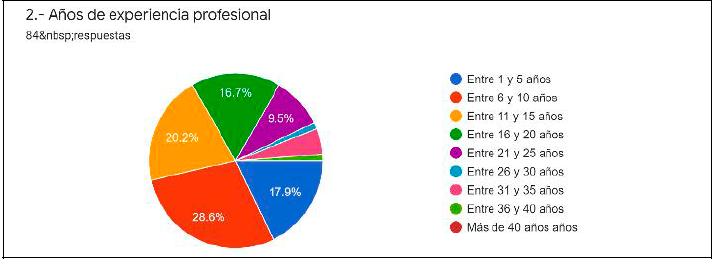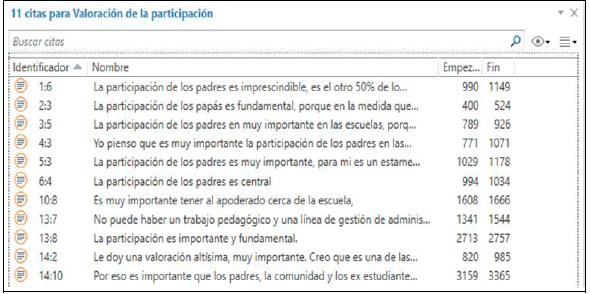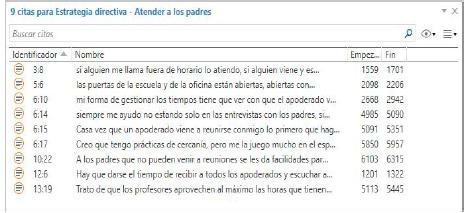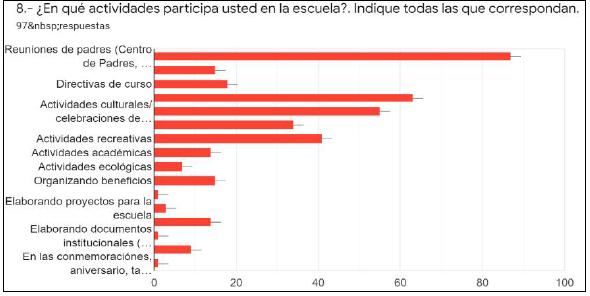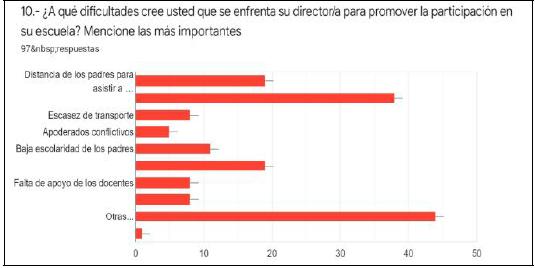Services on Demand
Journal
Article
Share
Educação & Formação
On-line version ISSN 2448-3583
Educ. Form. vol.7 Fortaleza 2022 Epub June 28, 2022
https://doi.org/10.25053/redufor.v7.e7630
ARTIGO
Management skills, parent participation in elementary schools in Chiloé, Chile
iFundación Investiga a Chiloé, Isla de Chiloé, Chile. E-mail: clabapineiro@gmail.com
iiFundación Investiga a Chiloé, Isla de Chiloé, Chile. E-mail: marcamposmen@gmail.com
iiiUniversité de Ciego de Ávila Máximo Gómez Báez, Ciego de Ávila, Cuba. E-mail: oruamcmg@gmail.com
It shows the main findings regarding a valuable knowledge that emerges from a study focused on the managerial competencies that principals possess and mobilize to promote parental participation in elementary schools in the Province of Chiloé in Chile. Conceptions and evaluations about parental participation, practices and strategies that mobilize directors, activities and levels of participation and elements of the context that favor and hinder said participation are exposed. A qualitative interpretive paradigm approach and a descriptive-oriented Case Study methodology were used, therefore, it opted for an inductive / deductive study. The analysis of the information, allowed to obtain conclusions about the decisive importance of the directive role and leadership to work together with the parents to strengthen the formation and learning of the students.
Keywords: school management; skills; management practices; pedagogical participation; educational leadership
Mostram-se as principais conclusões a respeito de um valioso conhecimento que surge de um estudo focado nas competências gerenciais que os diretores possuem e mobilizam para promover a participação dos pais nas escolas primárias da província de Chiloé, no Chile. São expostas concepções e avaliações sobre a participação parental, práticas e estratégias que mobilizam dirigentes, atividades e níveis de participação e elementos do contexto que favorecem e dificultam essa participação. Utilizaram-se uma abordagem qualitativa do paradigma interpretativo e uma metodologia de Estudo de Caso de orientação descritiva, que, portanto, resultou em um estudo indutivo/dedutivo. A análise da informação permitiu obter conclusões sobre a importância decisiva do papel diretivo e da liderança para trabalhar em conjunto com os pais para potenciar a formação e aprendizagem dos alunos.
Palavras-chave: gestão escolar; competências; práticas gerenciais; participação pedagógica; liderança educacional
Se muestran los principales hallazgos respecto de un valioso conocimiento que emerge de un estudio centrado en las competencias directivas que poseen y movilizan los directores para promover la participación de los padres en las escuelas básicas de la Provincia de Chiloé en Chile. Se exponen concepciones y valoraciones sobre la participación de padres, prácticas y estrategias que movilizan los directores, actividades y niveles de participación y elementos del contexto que favorecen y dificultan dicha participación. Se utilizaron un enfoque cualitativo de paradigma interpretativo y una metodología de Estudio de Caso de orientación descriptiva, que, por tanto, decantó en un estudio inductivo/deductivo. El análisis de la información permitió obtener conclusiones acerca de la importancia decisiva del rol y liderazgo directivo para trabajar mancomunadamente con los padres para fortalecer la formación y los aprendizajes de los estudiantes.
Palabras clave: dirección escolar; competencias; prácticas directivas; participación pedagógica; liderazgo educativo
1 Introduction
This study focuses on the analysis and understanding of elementary school principals' role in the development of family participation in the support and supervision of their children's schooling, in the Province of Chiloé, given the complexity of school management as a whole and the relevance of the role of principals in improving education.
With this objective in mind, we could answer some questions: How do directors perceive and value the concept of participation? What are the key management skills they use to promote participation? What are the main practices and strategies utilized by principals to boost participation? What activities that promote parental participation take place within elementary schools? What are the main difficulties and what facilitates participation? among others no less important questions.
Therefore, we focus on the principals' role. Thus, we investigate the contribution made by the competency-based approach development as an element that favors a managerial approach aimed at strengthening parents' participation and emphasizes a formative focus that contributes to students' improvement.
2 Materials and methods
2.1 Theoretical foundation
In the last three decades, society has evolved rashly in all spheres as a result of advances in technology, communications, and information. This imposed new relationships forms and styles that, in the field of education, undoubtedly disturbed the management of schools, school culture, teaching methodologies, axiological conceptions, and the profile of the new human being that today's society demands.
Faced with this challenging context, schools must change and move towards gradual adaptation processes that allow them to meet their educational mission in a context of uncertainty, socio-sanitary, environmental crises, and permanent changes.
We see the school principal as the most significant leader capable of making those adaptation processes possible; and parents as the key articulators and collaborators in the educational processes of their children and for the improvement of educational institutions. On this topic, Barrientos, Silva and Antúnez (2016, p. 48), concerning the principals, reaffirm that:
[...] su desempeño como líderes debe dinamizar y motivar los procesos de participación de todos los actores educativos, orientando sus actuaciones bajo los principios de corresponsabilidad, cooperación, coordinación y autoridad democrática una participación que debe ser entendida como un acto inclusivo que permita a las personas incidir en el rumbo de la organización a través de sus actuaciones, opiniones y toma de decisiones.
In the works of Barrientos and Marichal (2019), Marichal and Barrientos (2019), Marichal, Barrientos and Hernández (2019) and Marichal, Rodríguez and Cáceres (2018), the importance of training leaders for school principals is emphasised.
The information and professional experience available allow us to argue, among other issues, that there are no studies in this area in the Province of Chiloé and the actions that have been developed in this context have little impact. Therefore, this study is highly relevant, even more so when we will soon be faced with a post-pandemic scenario that will change relations and school cultures at all levels, in which the parents' responsibility and commitment will have to increase.
Today, our schools need to be led by highly competent professionals who promote good interpersonal relationships, with a holistic view of education, agents of democratic practices and promoters of inclusion and socio-educational participation, who consider the construction and making of persons as a principal, through collaborative work with the students' families. Therefore, it's imperative to move towards the empowerment of a balanced and sustainable managerial leadership (HARGREAVES; FINK, 2008; LEITHWOOD, 2009; MURILLO, 2006), which allows the formation of new leaders and considers the development of people and diversity as essential conditions for continuous institutional improvement.
We believe that the education's great challenge must be to strongly encourage collaborative relationships between schools and families, establishing a solid dialogue because of the positive socio-educational impact parents' involvement has on their children's education, as is the consensus of many authors (ANTÚNEZ, 2000); BARRIENTOS, 2015; DOMÍNGUEZ; FERNÁNDEZ, 2007; PARELLADA, 2003). These scholars claim that greater parent participation, with a pedagogical approach, makes it possible to manage the improvement of the complexity of society, the objectives of education, and the students' schooling, under the wing of involvement based on the co-responsibility that each educational agent is responsible.
That is why we support the competence development model, upon which we will conceive this concept as the:
[...] conjunto combinado de saberes, habilidades, destrezas, actitudes, valores, motivaciones y rasgos de personalidad que se articulan y movilizan en las acciones en contextos determinados, para la efectiva resolución de problemas propios del desempeño laboral. (BARRIENTOS, 2015, p. 101).
As reasserted by Aramendi (2008, p. 148), who states that:
[...] será fundamental movilizar competencias relacionales que discurran en las dimensiones intrapersonales (con uno mismo), interpersonales (con los demás), grupales y reticulares (redes sociales y virtuales), que propendan a una mayor cohesión entre los miembros de la comunidad educativa.
Likewise, it will be necessary to give special consideration to the emotional competences proposed by the classic Goleman (1996). With these ideas, we understand the concept of participation not only as the action of being part of something, since participation: "[...] must be seen broadly and not in a limited way; reaffirming that it is a process involving individuals and groups as subjects and actors in decisions and actions that affect them or their environment" (FLAMEY et al., 2005, p. 10).
These approaches allow us to reaffirm that the leadership within schools practiced by principals is fundamental, as they must emphasize learning, therefore, it must have a character: "[...] pedagogical that guides the school work with a vision of the future within a framework of ethical action, creating spaces of trust and participation in an environment that guarantees respect and the community inclusion" (MINEDUC, 2015, p. 9). It's also imperative to underscore the need to strengthen parents' participation in schools with a preferential focus and intentionality on the formative aspects that contribute to improving their children's learning.
According to Kidder (2013), there are multiple activities that families can develop at home in a planned and autonomous way, which undoubtedly can have a substantial impact on improving children's learning and school performance. In this way, Barrientos (2015) suggests that, through the management and with the support of the Parent Centers, they coordinate instances that allow the development of actions such as the following:
a) Monitoring: homework and school activities supervision at home on a regular and constant basis.
b) Support and motivation: Permanent dialogue and conversation with the students, aiming to strengthen emotional support and the search for meaning around their school activities and responsibilities.
c) External actions: voluntary interviews with teachers and principal, participation in activities scheduled by the school that strengthen the bonds of mutual recognition between parents and children.
d) Search for meaning and autonomy: Development of activities that strengthen children's autonomy and personal growth, promoting and motivating the development of hobbies (individual and collective) with participation in complementary educational activities in the near environment (sports, music, scouting, volunteering, ecology, painting, religion, etc.).
2.2 Methodology
The research was developed using a qualitative approach, from an interpretive paradigm, with an ethnographic design that focused on "[...] describing and analyzing ideas, beliefs, meanings, knowledge, and practices of groups, cultures, and communities" (PATTON, 2002 apud HERNÁNDEZ; FERNÁNDEZ; BAPTISTA, 2006, p. 697). In the case of Rodríguez, Gil and García (1999), they focused on a natural social context, whose object of study was analyzed in its normal dynamics, without manipulating or modifying it. The authors endorse this approach stating that qualitative research "[...] studies reality in its natural context, as it happens, trying to make sense or interpret phenomena according to the meanings they have for those involved" (RODRÍGUEZ; GIL; GARCÍA,1999, p. 32).
We focus on a Case Study (STAKE, 2007) following the guidelines of Latorre, Del Rincón and Arnal (1996) and Sandín (2010), this constitutes a research method of great importance for the analysis of the social reality in the development of social sciences and humanities and represents the most relevant and natural form of research-oriented from a qualitative perspective.
2.3 Data collection
The research was conducted before the pandemic. So, the results and conclusions that emerged were based on a normal school scenario. The primary source of information was a group of 11 public elementary school principals working in the Province of Chiloé, both in urban and rural areas, with experience equal to or greater than two years in the position in the area. An individual, unstructured and in-depth interview was conducted with this group.
The complementary sources were the group of teachers and parents connected to the schools in which the principals in the study work. A total of 84 teachers and 97 parents participated. They answered a survey, both online and in-person, with both subjective and multiple-choice questions, intending to uncover their views on the competencies and performance of principals concerning practices and strategies to promote participation. The instruments of this study were validated through the criteria of 30 expert judges from seven countries; Delphi was used in three rounds.
2.4 Information analyzes
The information collected in the interviews was analyzed inductively using the Atlas.ti 8 software, a process from which six analysis meta-categories emerged: Managerial Vision; Professional Competencies; Management Practices; Strategies to Promote Participation; Participation Activities; and Contextual limitations.
Information from teacher and parent questionnaires was collected using Google Forms, the subjective responses were analyzed manually using a qualitative approach.
3 Results
The study results are distributed in two relevant sections: sample characterization and study topics, which are described in detail below.
Sample characteristics: Most teachers work in urban areas, with a participation rate of 52.4%. Regarding the commune where they live, teachers from the 10 communes of the Province participated, with the sample distributed in percentages as shown in Graph 1.
Regarding professional experience, the highest participation was concentrated among beginner teachers and those with up to 10 years of experience, followed by those with between 11 and 20 years of experience. Markedly female participation stands out, with 86.6%, results that corroborate the biggest role of mothers in the students' school activities.
3.1 Study thematic dimensions
Participation concept: As the principles frame participation as a concept so the process varies greatly. As a concept, most relate it to the act of collaboration, involvement, incorporation, and commitment. As a process, only one of them relates it to decision-making. This allows us to understand that participation has very different connotations and that there is no single meaning. The most accepted idea is that participation is synonymous with attending school for activities, without making it clear that it's an act connected to children's educational support.
Valuing participation: 100% of answers value parents' participation as fundamental, stating that without them it is not possible to work properly. Teachers agree with principals and add that participation has a direct impact on school performance and students' social, intellectual, and values-based education.
Directive practices: Directive practices which are understood as "[...] the set of behaviors that reflect what the principles do to promote parental involvement" (BARRIENTOS, 2015, p. 98), are varied. Two principals report that they regularly attend parent meetings if only to say hello; one emphasizes warm welcomes to parents when they come to school; two others report having permanent, fluid, and close contact with their parents; only one reports that he encourages teachers to be close to parents.
Strategies: In terms of managerial strategies, which are understood as "[...] the set of planned and concrete actions that reveal the managers' ways of doing, concerning their practices, mobilizing a variety of resources, devices, tools, and decisions to do it" (BARRIENTOS, 2015, p. 98), a series of actions were identified that are related to assisting parents cordially and promptly; considering their opinions; maintaining communication and making calls through WhatsApp groups, phone calls, invitation cards, written calls, and Facebook; relating to the community through participation in local institutions; maintaining good interpersonal relationships, fostering trust through informal relationships.
Personal competencies: An interesting variety of attributes have emerged that invite us to define and redefine the relevant attitudinal conditions in this regard, such as
Listening: 85% of principals acknowledge that they listen to parents' ideas and opinions, are inclined toward consensus, and do not impose their opinions.
Accepting Criticism: Most principals don't openly acknowledge being on the side of the critic.
Empathy and cordiality: 50% of principals say they are affectionate, respectful, and empathetic, which shows traces of cordiality.
Simplicity and Humility: Being a simple and humble person doesn't seem to be a personality trait that principals consider relevant to promoting parental involvement. Only three principles make explicit reference to this, which is dichotomous with the results of the study carried out byBarrientos (2015), in which these attributes were considered very relevant.
Accountability: Accountability appears as a condition of minor importance as competence to promote participation since only three principals mention it.
Effective communication: Not presented as a relevant skill to promote parent involvement. Only two of them refer to this, stating that having a "good discourse" helps them to direct the conversation and convey information properly.
Respect: Only three principals state that treating parents well and respectfully are relevant conditions for promoting parental involvement. Like cordiality, this seems to be a very natural trait.
Trust builders: At least three of the 11 principals expressly state that they build trust with the parents and that this skill is highly valued by parents.
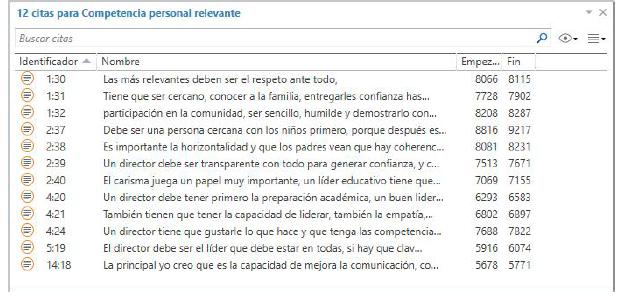
Source: Atlas.ti 8.
Figure 4 Reference to relevant managerial competence to promote parent involvement
On the other hand, teachers believe that principals should stand out for having high competencies or personal resources, such as empathy. In addition, they emphasize leadership as a key competence for improving educational processes. They consider relevant the mobilization of skills such as responsibility, trust, credibility, sympathy, sociability, and proximity; communicative, committed, decisive, welcoming, and transparent attributes, attributes that aren't evidently seen in investor accounts. They say it's important to be someone who promotes equal opportunities and encourages harmony and free speech. Likewise, they must know the context, the culture of the place, and the ability to convene.
Meanwhile, the vast majority of parents agree that the main personality traits a principal must possess to promote participation should be: Communicative, Empathetic, and Responsible: Communicative, Empathetic, and Responsible.
50% of principals say those in leadership positions must have highly developed people skills, such as listening and being consistent, trustworthy, and warm. In terms of values, they must be respectful, honest, generous, considerate, and understanding and socially committed.
Leadership: At least 40% of directors say they take their position with charisma. They say that to exercise real leadership, they must be socially sensitive, generate trust and respect, and always listen to the parents. Thus, seven of the 11 principals recognize that they exercise democratic leadership and promote the horizontal management of people. The remaining four don't identify what type of leadership they belong to.
Participation activities: The most recurrent activities were identified and grouped in the following areas:
Meetings: This is the most traditional participation activity. All committees hold extended meetings at least twice a year.
Recreational activities: An important part of the activities is recreational, with high parental participation. They are held around school birthdays, family outings, field trips, family day celebrations, students' day, children's day, project closure, health support, and fellowship meetings, among others.
Artistic and cultural activities: These activities are very traditional and institutionalized. They are held around events to rescue local and national cultural traditions (Fiesta de San Juan, Ano Novo Mapuche, Dia do Chile, Independence Day, Mother's Day). Parents participate by preparing typical foods and, in some cases, there are discussions.
Collaboration with work: these activities are becoming less and less frequent. Only four principals say they sometimes ask parents to make improvements to the school. Among the activities that are covered less frequently are Project development, opinion polls, training activities/workshops. Teachers reaffirm the principals' indications, pointing out the most relevant activities, classified between the most and the least traditional:
Formal environment: parents' meetings; class and school board meetings; personal interviews or appointments.
Informal: School birthdays; artistic events for birthdays such as Mother's Day and Independence Day parades; School Olympics; sports activities; cultural activities such as Heritage Day, Chile Day and Wetripantu.
Difficulties: Headteachers, teachers, and parents agree that the main difficulty is related to the parents' lack of time due to their jobs. Another important element is the adverse weather conditions and the geographical distance from the families' residences.
At least three headteachers say that it's often difficult for them to carry out activities due to the size of the physical space and lack of financial resources.
4 Discussion
We agree with Barrientos' approach (2015, p. 266), which argues that parental participation must be rethought, and the principles must "[...] promote a culture of pedagogical participation of families and the community, which strengthen your involvement with a formative sense".
In the studies by Tardin and Romero (2022), a survey was carried out about the Pedagogical Residency Program, in which it's explained that it has been an alternative to contribute to the initial training. Despite the pandemic, the "exchange of experiences between peers" is highlighted as a positive point, where participation and collaboration stand out.
Participation mainly takes the form to attend school functions and at low levels of participation (informative and consultative), as shown by studies by Antúnez (2000), Barrientos (2015) e Flamey, Gubbins e Morales (1999).
As for the follow-up and educational support at home, we agree with Barrientos (2015) e Kidder (2013 apud BARRIENTOS, 2015).
5 Final considerations
Conceptions, evaluations, and new guidelines for parental participation: school directors must promote actions that allow the grouping of clear criteria on how to develop participation, which will be beneficial to devise action plans in this regard.
There is a prevailing idea that participation means personally attending school activities, which contributes to improving family cohesion, teacher-student relationships, and coexistence, strengthening an inclusive community culture.
Parents' participation is a fundamental area for the follow-up processes in the education of students and fundamental for strengthening children's education. However, in practice, these statements are reductive. It's necessary to move towards greater levels of involvement in shared decision-making between schools and families.
In the Province of Chiloé's case, schools promote parental participation marked by a traditional model, which favors participation in festive and recreational activities, a similar situation that occurs in other contexts, according to the study carried out by Barrientos (2015).
Principals should increase their leadership by promoting a new way of conceiving parent participation, even more so in a post-pandemic scenario, favoring pedagogical intentionality focused on training.
Principals' personal competencies: Promoting parental involvement is a complex area to be addressed and requires leaders with personal resources that allow them to generate trust, establish good personal relationships through sociable, friendly, and respectful treatment, can listen and create a harmonious and respectful environment.
Management practices and strategies: They seem traditionalist and haven't evolved substantially, except to hand out information, with the use of email, Facebook, and WhatsApp messages.
Participation activities: Parents are linked to school activities, most of the time as observers and audience, and the minority as active participants.
Parent meetings are the most frequented activities and sending of written communications are the most traditional channels of information. As well as festive and artistic-cultural activities. However, training activities or workshops for parents are sporadic, and schools don't have institutionalized activities that promote the strengthening of parenting skills, a similar situation that occurs in other contexts, according to the study carried out by Barrientos (2015).
Difficulties: The main one is connected to arents' lack of time due to their work. It's advisable to consider the need to promote new forms of school monitoring from home.
REFERENCES
ANTÚNEZ, M. S. La acción directiva en las instituciones escolares: análisis y propuestas. Barcelona: Horsori, 2000. [ Links ]
ARAMENDI, P. Las competencias relacionales en la dirección. In: CONGRESO INTERUNIVERSITARIO DE ORGANIZACIÓN DE INSTITUCIONES EDUCATIVAS. 10., 2008, Madrid. Actas [...]. Madrid: UAB, 2008. [ Links ]
BARRIENTOS, C. El papel de los directores y directoras en la promoción de la participación familia y comunidad en las escuelas básicas: el caso de la Comuna de Panguipulli - Chile. 2015. Tesis (Doctorado en Educación) - Programa de Postgrado en Educación, Universidad de Barcelona, Barcelona, 2015. [ Links ]
BARRIENTOS, C.; MARICHAL, O. C. Competencias y liderazgo directivo para promover la participación de familias y comunidad en las escuelas. In: CONGRESO INTERNACIONAL SOBRE LIDERAZGO Y MEJORA ESCOLAR. 3., 2019, Santiago de Chile. Actas [...]. Santiago de Chile: Rilme, 2019. p. 268-272. [ Links ]
BARRIENTOS, C.; SILVA, B.; ANTÚNEZ, M. S. Competencias directivas para promover la participación familias en las escuelas básicas. Educación, Lima, v. 25, n. 49, p. 45-62, 2016. [ Links ]
DOMÍNGUEZ, E.; FERNÁNDEZ, L. Familia y escuela. In: BENSO CALVO, M. C.; PEREIRA DOMÍNGUEZ, M. C. (coord.). Família y escuela: el reto de educar en el siglo XXI. Madrid: Concellería de Educación, 2007. p. 109-143. [ Links ]
FLAMEY, G. et al. Participación de los Centros de Padres en Educación. 2. ed. Santiago de Chile: Unicef, 2005. [ Links ]
FLAMEY, G.; GUBBINS, V.; MORALES, F. Los centros de padres y apoderados: nuevos actores en el control de la gestión escolar. Santiago de Chile: CIDE, 1999. [ Links ]
GOLEMAN, D. Inteligencia emocional. Barcelona: Kairós, 1996. [ Links ]
HARGREAVES, A.; FINK, D. El liderazgo sostenible: siete principios para el liderazgo en centros educativos innovadores. Madrid: Morata, 2008. [ Links ]
HERNÁNDEZ, R.; FERNÁNDEZ, C.; BAPTISTA, P. Metodología de la investigación. México: Mc Graw Hill, 2006. [ Links ]
KIDDER, A. El papel clave de las familias en educación. Educación en el Siglo XXI, [S.l.], 2013. Disponível em: http://goo.gl/E7B3ut. Acesso em: 14 jan. 2014. [ Links ]
LATORRE, A.; DEL RINCÓN, D.; ARNAL, J. Bases metodológicas de la investigación educativa. Barcelona: GR92, 1996. [ Links ]
LEITHWOOD, K. ¿Cómo liderar nuestras escuelas?: aportes desde la investigación. Santiago de Chile: Fundación Chile y Fundación CAP, 2009. [ Links ]
MARICHAL, O. C.; BARRIENTOS, C. Conceptualización teórica competencia del liderazgo educacional en directores de escuelas. In: CONGRESO INTERNACIONAL DE EDUCACIÓN E INNOVACIÓN. 18., 2019, Coimbra. Actas [...]. Coimbra: Aidipe, 2019. p. 1791-1802. [ Links ]
MARICHAL, O. C.; RODRÍGUEZ, A.; CÁCERES, M. P. Impacto del grupo de discusión en el liderazgo directivo y su “praxis” inclusiva en el contexto educativo cubano. In: CONGRESO INTERNACIONAL: LIDERAZGO INVESTIGACIÓN Y PRÁCTICAS INCLUSIVAS. 15., 2018, Granada. Actas [...]. Granada: UGR, 2018. p. 177-185. [ Links ]
MARICHAL, O. C.; BARRIENTOS, C.; HERNÁNDEZ, N. La relación del liderazgo con la Ciencia-Tecnología-Sociedad y sus dimensiones. Educación y Sociedad, [S.l.], v. 17, n. 3, p. 61-75, 2019. [ Links ]
MINEDUC. Marco para la buena dirección y el liderazgo escolar. Santiago de Chile: Ministerio de Educación, 2015. [ Links ]
MURILLO, J. Dirección escolar para el cambio: del liderazgo transformacional al liderazgo distribuido. Revista Electrónica Iberoamericana sobre Calidad, Eficiencia y Cambio en Educación, Madrid, v. 4, p 11-24, 2006. [ Links ]
PARELLADA, C. La participación de los padres y madres en la escuela. Un espacio de comunicación y crecimiento múltiple: familias y centros educativos. In: LÓPEZ, F. (coord.). La participación de los padres y madres en la escuela. Barcelona: Graó, 2003. p. 15-25. [ Links ]
RODRÍGUEZ, G.; GIL, J.; GARCÍA, E. Metodología de la investigación cualitativa. Málaga: Aljibe, 1999. [ Links ]
SANDÍN, M. P. La investigación cualitativa en educación: fundamentos y tradiciones. Madrid: McGraw Hill, 2010. [ Links ]
STAKE, R. Investigación con estudio de casos. Madrid: Morata, 2007. [ Links ]
TARDIN, H. P.; ROMERO, L. R. Formação prática na Residência Pedagógica em tempos de pandemia: reflexões sobre contribuições e aperfeiçoamento. Educação & Formação, Fortaleza, v. 7, e7342, 2022. Disponível em: https://www.revistas.uece.br/index.php/redufor/article/view/7342 Acesso em: 14 jan. 2014. [ Links ]
Received: January 11, 2022; Accepted: May 17, 2022; Published: June 20, 2022











 text in
text in 


